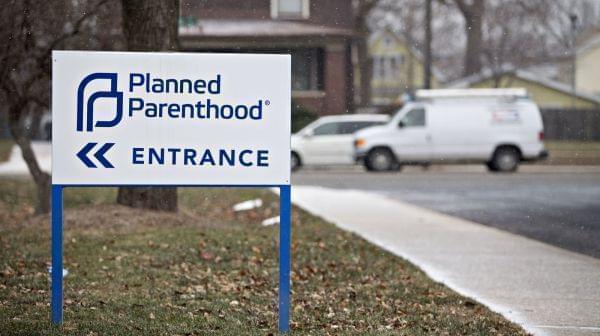What You Need To Know About The Coming Fight Over Planned Parenthood Funding

Signage is displayed outside a Planned Parenthood office in Peoria, Ill. Donald Trump's political inner circle is very much in favor of defunding the organization. Daniel Acker / Bloomberg via Getty Images
House Speaker Paul Ryan announced Thursday that Republicans will — once again — vote to cut off federal tax dollars for Planned Parenthood. They are planning to include the measure as part of a bigger upcoming bill to repeal pillars of Obamacare. This isn't the first time that they have tried to pass this type of legislation — President Obama vetoed a similar bill last January.
But with a Republican president about to take office, the party now has the best chance in more than a decade to get it signed into law. They also have a powerful legislative tool on their side: special budget rules that will let them offer their proposal on a measure that needs only 51 votes — meaning a Democratic filibuster can't stop it. But the path to victory might not be totally clear, as President-elect Trump's position on abortion has wavered and allies of Planned Parenthood vow not to go down without a fight.
Here are four key points to keep in mind as the parties gear up for a fight on Capitol Hill:
1. Planned Parenthood is not directly funded by the government, but it does receive payment from federal funds
This is a key distinction. While Planned Parenthood is not funded directly by the government, it does receive payment and grants from federal programs. Planned Parenthood's clinics provide a number of health services, mostly for low-income women. And so consequently, the organization often bills Medicaid for reimbursement. It also receives funding through Title X, a federal grant program for family planning services. However, neither Medicaid nor Title X fund the abortion services, which many people associate with Planned Parenthood. Medicaid does have some narrow exceptions for this in the case of rape, incest or life of mother.
And this gets at the heart of one of the nation's longest running and divisive political debates — not only to what extent the federal government should direct its fiscal policy on women's health matters, but whether abortion should be legal at all.
2. Planned Parenthood has become increasingly polarized: targeted by the GOP, championed by Democrats
Planned Parenthood has been a political target for years. But recently, the partisan polarization has gone beyond abortion rights and into any federal funds going to the organization. Republicans have more vehemently opposed Planned Parenthood in recent years for facilitating the transfer of fetal tissue for medical research. Concern over this practice led Republican Judiciary Committee Chairman Chuck Grassley of Iowa to recently refer several Planned Parenthood affiliates to the FBI and the Department of Justice for further investigation. The issue of tissue transfer also became the subject of a select committee review, which released a heavily critical report this week.
3. Republicans aren't quite sure Donald Trump is on their side
Republican lawmakers are confident in their effort, because for the first time in a decade, the party will control both chambers of Congress and the White House. But Donald Trump has a mixed record on Planned Parenthood. During the campaign, he praised the organization for doing "very good work" for "millions of women." But he's also supported cutting off federal funding.
That said, Trump's political inner circle is very much in favor of defunding the organization. Vice President-elect Pence, for example, is a longtime leader in this effort with zero ambiguity in his record. He offered legislation to this effect when he was in the House. Speaker Ryan is also personally very much in favor of defunding Planned Parenthood. But Ivanka Trump may be the person to watch. She has been a moderating force for her father on many women's issues.
4. Planned Parenthood is gearing up for a fight
Not without one hell of a fight, they aren't. #ProtectOurCare https://t.co/6lYnJhoyv2
— Cecile Richards (@CecileRichards) January 5, 2017
Planned Parenthood President Cecile Richards took to Twitter to respond to the GOP's efforts saying, "Not without one hell of a fight, they aren't."
Richards may well be pointing to Senate Democrats' past successes at defeating this type of legislation. They've succeeded in the past, in part, because of Republican allies — Maine Sen. Susan Collins and Alaska Sen. Lisa Murkowski — who they will likely need to lean on again.
Beyond Capitol Hill, Planned Parenthood has decades-long experience organizing and a loyal constituency. It is also a sponsor of the women's march planned to protest Trump's inauguration this month in Washington, which some estimates project as many as 200,000 women may attend. Plus, to an extent, it has public opinion on its side. Public polling has consistently shown that the majority of Americans oppose cutting off all funding for Planned Parenthood. So, there is certainly at least some potential political risk for Republicans.
Links
- Shimkus Supports Defunding Planned Parenthood, Avoiding Government Shutdown
- Planned Parenthood Sues Indiana On Abortion Pill Law
- Indiana, Planned Parenthood Back in Court
- Officials Urge Ind. Planned Parenthood to Split Up
- Planned Parenthood: Monday Ruling Needed on Indiana Law
- Planned Parenthood: 7 Clinics Close if Law Stands
